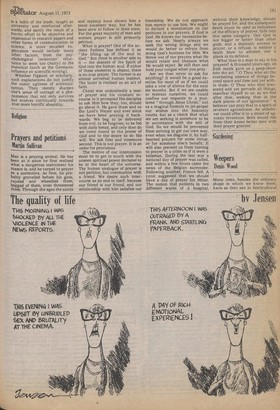Religion
_ Prayers and petitions
Martin Sullivan
Man is a praying animal. He has been at it since he first realised What a dangerous instrument his reason is, and he turned to prayer as a corrective. At first, he probably grovelled before his gods, cajoled and wheedled them, begged of them, even threatened them. Through the ages the saints and mystics have shown him a more excellent way, but he has been slow to follow in their train. For the great majority of men and women prayer is still primarily petition.
What is prayer? One of the ancient Fathers has defined it as "the lifting up of the soul to God." But there is another side to it — the descent of the Spirit of God into the human soul. If either of these elements is absent, there is no true prayer. The former is an almost universal human instinct. The latter is realised as an act of faith.
Christ was undoubtedly a man of prayer and his constant recourse to it prompted His disciples to ask Him how they, too, should go about it. He gave them and us the Lord's Prayer and ever since we have been praying it backwards. We beg to be delivered from evil, to be forgiven, to be fed with daily bread, and only then do we come round to the praise of God and to the desire to do His will. We ask first and commune second. This is not prayer. It is an order for provisions.
The motive of our intercession must be to get in touch with the unseen spiritual power declared to be at the heart of the universe. The human analogue of prayer is not petition, but communion with a friend. We desire such intercourse as an end in itself, because our friend is our friend, and our relationship with him satisfies our friendship. We do not approach him merely to use him. We ought to declare a moratorium on our petitions in our prayers. If God is God, He knows our necessities before we ask. Nearly always we seek the wrong things and we would do better to refrain from doing God's business for Him. We throw out of our prayers what He would retain and treasure what He would reject. Be still then and hold your tongue when you pray.
Are we then never to ask for anything? It would be a good exercise for most of us if we could take a vow of silence for the next six months. But if we are unable to restrain ourselves, we could confine our requests to a muttered " through Jesus Christ," not as a magical formula to jet-propel our wishes into the heavenly courts, but as a check that what we are seeking is somehow to be in accordance with the will of God. So we would be prevented from striving to get our own way, even when we disguise it, by halfhearted prayers for some virtue, or for someone else's benefit. It will also prevent us from turning to prayer in a crisis as if it were a talisman. During the last war a national day of prayer was called, and within a few hours came the news of the Belgian surrender. Following another, France fell. A cynic suggested that we should have a day of prayer for Hitler. The notion that patients in two different wards of a hospital, without their knowledge, should be prayed for, and the subsequent death count be used as indication of the efficacy of prayer, falls into this same category. Our God is not bigger or better than other gods, and a dramatic answer to prayer, or a refusal, is neither a death blow to atheism nor a plank in its defence.
What then is a man to say in his prayers? A thousand years ago, an Irish monk gave us a peep-show into the art. ".0 Thou who art the everlasting essence of things beyond space and time and yet within them; 0 Thou who dost transcend and yet pervade all things, manifest thyself to us, as we feel after thee, seeking thee in the dark places of our ignorance." A believer can pray that in a spirit of reverent agnosticism. An unbeliever could offer it in a mood of agnostic reverence. Both would rise from their knees better men with their prayer granted.


































 Previous page
Previous page